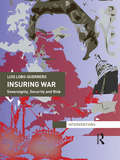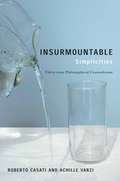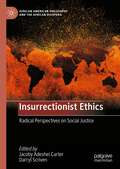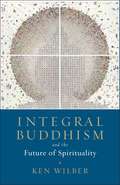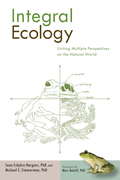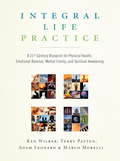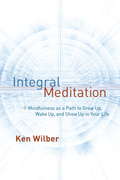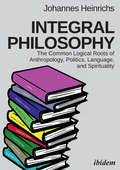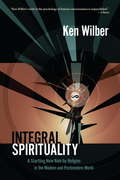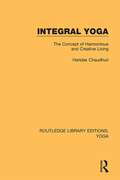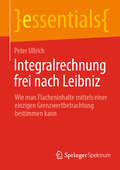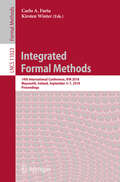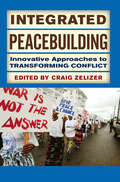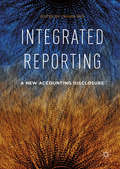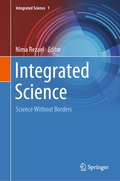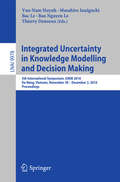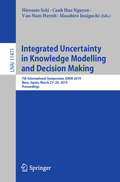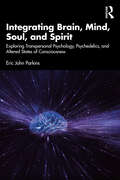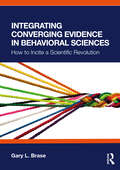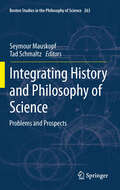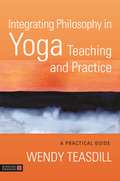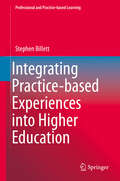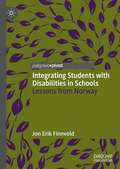- Table View
- List View
Insuring War: Sovereignty, Security and Risk (Interventions)
by Luis Lobo-GuerreroInsurance is a central, if until now ignored, instrument of war in the modern period. Ever since the eighteenth century, interaction between governments and insurers in Western countries has materialised in the form of war risk schemes that have contributed to the waging of war and the preservation of peace. The operation of those schemes has given rise to a curious, if not innocent, association between practices of statehood and practices of risk, which are theorised here under the label of ‘insurantial sovereignty’. The book draws on the British experience of using maritime insurance as an instrument of war during the Napoleonic Wars, the two World Wars, and the early twenty-first century. It asks, what happens, when, under conditions of war, the sovereign adopts insurantial imaginaries and practices into its rationalities of government? In doing so the book makes a novel contribution to the understanding of liberal security and liberal governance which is central to the theory of Political Science and International Relations, the understanding of international political sociology, and international political economy. The book follows Insuring Security: Biopolitics, Security and Risk as the second of a trilogy that analyses how concepts and practices of power, risk and security materialise in the form of insurance as a central instrument of governance in the liberal world. Insuring Security: https://www.routledge.com/Insuring-Security-Biopolitics-security-and-risk/Lobo-Guerrero/p/book/9780415522854 Insuring Life: https://www.routledge.com/Insuring-Life-Value-Security-and-Risk/Lobo-Guerrero/p/book/9780415716079
Insurmountable Simplicities: Thirty-Nine Philosophical Conundrums
by Roberto Casati Achille Varzi"Perhaps not all the stories that follow are true. They could, however, be true, and the Reader is invited to ponder this."So begins Insurmountable Simplicities, Roberto Casati and Achille Varzi's colorful incarnation of the many philosophical conundrums that hide in the wrinkles of everyday life. Why do mirrors seem to invert left and right but not up and down? How do we know whether strawberries taste the same for everyone? Where is it written that we must observe the law, and if it is not written, why should we observe it? What if we could swap brains-or the rest of our bodies? Insurmountable Simplicities is filled with stories, dialogues, and epistolary exchanges that cover a range of themes-such as personal identity, causality and responsibility, fortune, the nature of things, the paradoxes of time and space, the interface between logic and language-in captivating and inventive ways.Clear, concise, and intellectually engaging, this internationally acclaimed book brilliantly demonstrates that the beauty of philosophy resides in its thorough engagement with the simplicities of the world, insurmountable as they might initially appear.
Insurmountable Simplicities: Thirty-nine Philosophical Conundrums
by Roberto Casati Achille VarziTwo internationally known philosophers offer elegant, intriguing, and scintillating stories that creatively explore a variety of philosophical questions.
Insurrection and Intervention
by Ned DobosDomestic sovereignty (the right of a government not to be resisted by its people) and international sovereignty (the moral immunity from outside intervention) have both been eroded in recent years, but the former to a much greater extent than the latter. An oppressed people's right to fight for liberal democratic reforms in their own country is treated as axiomatic, as the international responses to the revolutions in Tunisia, Egypt and Libya illustrate. But there is a reluctance to accept that foreign intervention is always justified in the same circumstances. Ned Dobos assesses the moral cogency of this double standard and asks whether intervention can be consistently and coherently opposed given our attitudes towards other kinds of political violence. His thought-provoking book will interest a wide range of readers in political philosophy and international relations.
Insurrectionist Ethics: Radical Perspectives on Social Justice (African American Philosophy and the African Diaspora)
by Jacoby Adeshei Carter Darryl Scriven'Insurrectionist Ethics' is the name given to denote the myriad forms of justification for radical social transformation in the interest of freedom for oppressed people. It is a set of advocacy systems that usually aim at liberation for specified populations under siege in a given society. While the identities of these beleaguered groups is always intersectional, one salient criterion of group membership is often chosen to be the rallying point for solidarity. Whether the movement is “Black Lives Matter, “Gay Pride”, or “Poor People’s Campaign,” at the nucleus of each is a cry for emancipation. The contributions in this volume put forward bold, forcefully argued, provocative claims that challenge in a fundamental and radical way the presuppositions, values, and beliefs that underwrite the systems and structures that insurrectionist ethics calls into question. The volume begins with a section defining and theorizing what insurrectionist ethics is, and then moves to a section studying insurrectionist ethics across the Americas. Additional sections focus on applications of and correctives to insurrectionist ethics, pragmatism and naturalism, and the past, present, and future of insurrectionist ethics.
Integral Buddhism: A Vision For The Future Of The Great Traditions-more Inclusive, More Comprehensive, More Complete-with Integral Buddhism As An Example
by Ken WilberAn edifying view of Buddhism from one of today's leading philosophers: a look at its history and foundational teachings, how it fits into modern society, and how it (and other world religions) will evolve.What might religion look like in the future? Our era of evolution in social consciousness and revolution in science, technology, and neuroscience has created difficulties for some practitioners of the world’s great spiritual traditions. How can one remain true to their central teachings while also integrating those teachings into a new framework that is inclusive of ongoing discoveries? Taking the example of Buddhism to explore this key question, Ken Wilber offers insights that are relevant to all of the great traditions. He shows that traditional Buddhist teachings themselves suggest an ongoing evolution leading toward a more unified, holistic, and interconnected spirituality. Touching on all of the key turning points in the history of Buddhism, Wilber describes the ways in which the tradition has been open to the continuing unfolding and expansion of its own teachings, and he suggests possible paths toward an ever more Integral approach. This work is a precursor to and condensed version of Wilber’s The Religion of Tomorrow.
Integral Ecology: Uniting Multiple Perspectives on the Natural World
by Marc Bekoff Michael E. Zimmerman Sean Esbjorn-HargensToday there is a bewildering diversity of views on ecology and the natural environment. With more than two hundred distinct and valuable perspectives on the natural world--and with scientists, economists, ethicists, activists, philosophers, and others often taking completely different stances on the issues--how can we come to agreement to solve our toughest environmental problems?In response to this pressing need, Integral Ecology unites valuable insights from multiple perspectives into a comprehensive theoretical framework--one that can be put to use right now. The framework is based on Integral Theory, as well as Ken Wilber's AQAL model, and is the result of over a decade of research exploring the myriad perspectives on ecology available to us today and their respective methodologies.Dozens of real-life applications and examples of this framework currently in use are examined, including three in-depth case studies: work with marine fisheries in Hawai'i, strategies of eco-activists to protect Canada's Great Bear Rainforest, and a study of community development in El Salvador. In addition, eighteen personal practices of transformation are provided for you to increase your own integral ecological awareness. Integral Ecology provides the most sophisticated application and extension of Integral Theory available today, and as such it serves as a template for any truly integral effort.
Integral Life Practice: A 21st-Century Blueprint for Physical Health, Emotional Balance, Mental Clarity, and Spiritual Awakening
by Ken Wilber Marco Morelli Adam Leonard Terry PattenOver the last thirty-five years, Ken Wilber has developed an Integral "theory of everything" that makes sense of how all the world's knowledge systems--East and West; ancient, modern, and postmodern--fit together and can elevate our awareness. Drawing on science, psychology, human development, spirituality, religion, and dozens of other fields, Integral Theory is a revolutionary framework for understanding ourselves and the world we live in. Now there is a way to not just think Integrally, but to embody an Integral worldview in your everyday life. Integral Life Practice is not just a new approach to self-development and higher awareness, but a way of making sense of--and making best use of--the existing treasure trove of insights, methods, and practices for cultivating a more enlightened life. It offers a uniquely adaptive approach to awakened living that's suitable for everyone: people with busy careers and families, college students, retirees, even hardcore athletes and yogis. It's geared for devout--and irreverent--people of any religion, or no religion! This highly flexible system will help you develop your physical health, spiritual awareness, emotional balance, mental clarity, relational joy, and energy level, within a framework that integrates all aspects of your life. Combining original exercises, vivid examples, cutting-edge theory, and illustrative graphics, Integral Life Practice is the ultimate handbook for realizing freedom and fullness in the 21st century.
Integral Meditation: Mindfulness as a Way to Grow Up, Wake Up, and Show Up in Your Life
by Ken WilberPrepare to encounter your mind in a radically new way as Ken Wilber introduces Integral Mindfulness, a meditative approach based on Integral Theory and Practice. This leading-edge technique combines, for the first time in history, the ancient paths of meditation and mindfulness--or Waking Up--with modern research into psychological development and human evolution--Growing Up--resulting in a complete and powerfully effective method of personal transformation.Integral Meditation focuses attention on the inner "maps" we use to navigate life--in relationships, at work and study, in play, in just about everything we do. Mindfulness is used to unearth these unconscious maps, then uproot them so that we can substitute happier and healthier perspectives. With experiential exercises, guided meditation instructions, and tools to identify the individual's own greatest potential, this book points the way to realizing our Supreme Identity--and to finding the reason why each of us has come into being: to embody and express in the world our unique perspective of Spirit.
Integral Philosophy: The Common Logical Roots of Anthropology, Politics, Language, and Spirituality
by Johannes HeinrichsThis cumulative course on Johannes Heinrichs’s philosophical works presents the essence of his previous publications: a rich, consistent, and novel monolithic system defying temptations by the zeitgeist. Starting with an emphasis on reflection as the basis of epistemology, Heinrichs also covers the mind-body dualism in an anthropology chapter, moves on to presenting summaries of his theory of democracy as well as his philosophical semiotics, followed by an outline of structural and integral ontology. An overview of ethical positions in the final chapter proves the fertility of Heinrichs’s theoretical-reflection methods.Heinrichs (born 1942 in Duisburg/Rhine, Germany) developed a “reflection system theory” which is an original up-to-date development of German idealism, inspired by the multi-value logic of Gotthard Günther. His reflection theory of language presents an alternative to the current language analysis as well as to Chomsky’s way of universal grammar. By his systematic approach, he opposes the mere historicism of most Western philosophers, also by the spiritual character of his very methodical philosophy. In spiritual respects, he is near to Sri Aurobindo.
Integral Spirituality: A Startling New Role for Religion in the Modern and Postmodern World (Psychology)
by Ken WilberIntegral Spirituality is being widely called the most important book on spirituality in our time. Applying his highly acclaimed integral approach, Ken Wilber formulates a theory of spirituality that honors the truths of modernity and postmodernity--including the revolutions in science and culture--while incorporating the essential insights of the great religions. He shows how spirituality today combines the enlightenment of the East, which excels at cultivating higher states of consciousness, with the enlightenment of the West, which offers developmental and psychodynamic psychology. Each contributes key components to a more integral spirituality. On the basis of this integral framework, a radically new role for the world's religions is proposed. Because these religions have such a tremendous influence on the worldview of the majority of the earth's population, they are in a privileged position to address some of the biggest conflicts we face. By adopting a more integral view, the great religions can act as facilitators of human development: from magic to mythic to rational to pluralistic to integral--and to a global society that honors and includes all the stations of life along the way.
Integral Yoga: The Concept of Harmonious and Creative Living (Routledge Library Editions: Yoga #4)
by Haridas ChaudhuriOriginated by the great sage of modern India, Sri Aurobindo, integral yoga has been presented in this volume, first published in 1965, in the context of modern western thinking. It expounds the concept of harmonious and creative living on the basis of a fruitful reconciliation of the self-perfecting mysticism of the East and the rationalistic humanism of the West. It gives a dynamic form, an evolutionary perspective, and a creative impetus to the ancient mystic idea of union with the eternal.
Integralrechnung frei nach Leibniz: Wie man Flächeninhalte mittels einer einzigen Grenzwertbetrachtung bestimmen kann (essentials)
by Peter UllrichIn einem Manuskript aus dem Jahre 1676 behandelt Gottfried Wilhelm Leibniz (1646–1716) die Integration monotoner Funktionen. Hieraus lässt sich eine Integrationstheorie entwickeln, mittels derer man alle in der Schule verwendeten Basisfunktionen integrieren und allgemeine Integrationsregeln herleiten kann. Im Gegensatz zu dem üblichen formalen Zugang benötigt diese Theorie nur einen propädeutischen Grenzwertbegriff, wie er in den KMK-Bildungsstandards gefordert wird; letztlich reicht eine einzige Grenzwertbetrachtung aus. Zudem wird die Integralrechnung nicht auf eine Umkehrung der Differentialrechnung reduziert.
Integrated Formal Methods: 14th International Conference, IFM 2018, Maynooth, Ireland, September 5-7, 2018, Proceedings (Lecture Notes in Computer Science #11023)
by Carlo A. Furia Kirsten WinterThis book constitutes the refereed proceedings of the 14th International Conference on Integrated Formal Methods, IFM 2018, held in Maynooth, Ireland, in September 2018.The 17 full papers and 5 short papers presented together with 3 invited talks were carefully reviewed and selected from 60 submissions. The conference covers a broad spectrum of topics: from language design, to verification and analysis techniques, to supporting tools and their integration into software engineering practice.
Integrated Peacebuilding
by Craig ZelizerIntegrated Peacebuilding addresses the importance of weaving peacebuilding methods into diverse sectors including development, humanitarian assistance, gender, business, media, health, and the environment--areas where such work is needed the most. Incorporating peacebuilding approaches in these fields is critical for transforming today's protracted conflicts into tomorrow's sustainable peace. Covering both theory and practice, Dr. Zelizer and his team of leading academics and practitioners present original essays discussing the infrastructure of the peacebuilding field--outlining key actors, donors, and underlying motivations--as well as the ethical dilemmas created by modern conflict. Exploring both the challenges and lessons to be found in this emerging field, Integrated Peacebuilding is perfect for courses on peacebuilding, conflict resolution, international development, and related fields.
Integrated Reporting
by Chiara MioThis book is a timely addition to the fast-growing international debate on Integrated Reporting, which offers a holistic view of the evolution and practice of Integrated Reporting. The book covers the determinants and consequences of Integrated Reporting, as well as examining some of the most relevant issues (particularly in the context of the United States) in the debate about Integrated Reporting.
Integrated Science: Science Without Borders (Integrated Science #1)
by Nima RezaeiThe “INTEGRATED SCIENCE: Science without Borders” is the first volume of INTEGRATED SCIENCE Book series, aims to publish the results of the most update ideas and reviews in transdisciplinarity fields, to highlight integration of different disciplines, including formal sciences, physical-chemical sciences and engineering, biological sciences, medical sciences, and social sciences. This is especially focused on the research involving the integration of two of more academic fields offering an innovative view, which is one of the main focuses of Universal Scientific Education and Research Network (USERN); science without borders. The whole world is suffering from complex problems; these are actually borderless problems; so, borderless solution could be the solution for such complex problems. Transdisciplinarity, as a domain that researchers work jointly, using shared conceptual framework drawing together disciplinary-specific theories, concepts and approaches to address common problem. Lack of confidence, lack of expertise, complexities of healthcare, the confusing nature of healthcare environments and lack of organization and standardization became obstacles to successful communication. Consequently, the book is to provide an overview of the basic elements of transdisciplinary studies and integrated science. The unique aspect of this book, privileging it from other books, is covering all aspects of science as a true one nature.
Integrated Uncertainty in Knowledge Modelling and Decision Making
by Van-Nam Huynh Thierry Denoeux Masahiro Inuiguchi Bac Le Bao Nguyen LeThis book constitutes the refereed proceedings of the International Symposium on Integrated Uncertainty in Knowledge Modeling and Decision Making, IUKM 2013, held in Beijing China, in July 2013. The 19 revised full papers were carefully reviewed and selected from 49 submissions and are presented together with keynote and invited talks. The papers provide a wealth of new ideas and report both theoretical and applied research on integrated uncertainty modeling and management.
Integrated Uncertainty in Knowledge Modelling and Decision Making: 7th International Symposium, IUKM 2019, Nara, Japan, March 27–29, 2019, Proceedings (Lecture Notes in Computer Science #11471)
by Van-Nam Huynh Masahiro Inuiguchi Hirosato Seki Canh Hao NguyenThis book constitutes the refereed proceedings of the 7th International Symposium on Integrated Uncertainty in Knowledge Modelling and Decision Making, IUKM 2019, held in Nara, Japan, in March 2019.The 37 revised full papers presented were carefully reviewed and selected from 93 submissions. The papers deal with all aspects of uncertainty modelling and management and are organized in topical sections on uncertainty management and decision support; econometrics; machine learning; machine learning applications; and statistical methods.
Integrating Brain, Mind, Soul, and Spirit: Exploring Transpersonal Psychology, Psychedelics, and Altered States of Consciousness
by Eric John ParkinsReferring to major spiritual traditions, transpersonal psychology, neuropsychology, neuroscience, and modern physics, this book identifies and systematically integrates core ideas concerning psychospiritual development.Integrating Brain, Mind, Soul, and Spirit presents neuropsychological research on psychedelics, with reference to mystical experience, and Psi/extrasensory perception as an extension of cognitively controlled brain-based homeostasis. The book equates concepts from modern physics with perennial metaphysics concerning intelligent consciousness, evolution, and the transfer of energy and information. It also compares spiritual literature regarding consciousness, spirit-soul, and brain-mind personality, to neuropsychological and psychological literature concerning emotion, cognition, and altered states of consciousness. Finally, a nested neuro-psycho-spiritual control hierarchy is presented as an architecture for systematically integrating; describing; and understanding brain, mind, soul, and spirit, and neuro-psycho-spiritual development.Providing a modern multidisciplinary perspective, and highlighting implications for psychiatry, psychotherapy, and education, this book is a must-read for students and researchers of transpersonal psychology, psychospiritual matters, and altered states of consciousness.
Integrating Converging Evidence in Behavioral Sciences: How to Incite a Scientific Revolution
by Gary L. BraseIntegrating Converging Evidence in Behavioral Sciences presents a fresh approach to understanding the landscape of scientific research, particularly within the behavioral sciences.By examining the needs for consistency and coherence across different scientific disciplines, this book offers readers a practical framework for evaluating and advancing their research topics. Through a comprehensive overview of established frameworks such as Marr’s computational framework and Tinbergen’s four questions, the book introduces a novel convergence framework specifically tailored to the behavioral sciences. This approach enables a more integrated view of scientific theories and knowledge, empowers researchers to pinpoint areas of high impact, and helps them to recognize potential revolutions in the field. The book serves a dual purpose: As a rubric for students and early-career researchers to grasp and navigate their research topics, and also as a resource for more advanced researchers seeking to delve into deeper issues and apply the framework across different contexts.This book is an essential guide for anyone interested in harmonizing scientific perspectives, developing more robust and interconnected fields of research, and potentially paving the way for groundbreaking discoveries.
Integrating History and Philosophy of Science
by Seymour Mauskopf Tad SchmaltzThough the publication of Kuhn's Structure of Scientific Revolutions seemed to herald the advent of a unified study of the history and philosophy of science, it is a hard fact that history of science and philosophy of science have increasingly grown apart. Recently, however, there has been a series of workshops on both sides of the Atlantic (called '&HPS') intended to bring historians and philosophers of science together to discuss new integrative approaches. This is therefore an especially appropriate time to explore the problems with and prospects for integrating history and philosophy of science. The original essays in this volume, all from specialists in the history of science or philosophy of science, offer such an exploration from a wide variety of perspectives. The volume combines general reflections on the current state of history and philosophy of science with studies of the relation between the two disciplines in specific historical and scientific cases.
Integrating Philosophy in Yoga Teaching and Practice: A Practical Guide
by Wendy TeasdillProviding simple explanations of the various philosophical strands underpinning yoga as well as guidance on how to integrate them into teaching, this practical work from Wendy Teasdill concerns itself with values that are often lost in modern-day practice. It looks at balance, moderation, introspection, self-development and liberation, integrating these into asana practices in a way that deepens the experience. Each chapter covers a particular aspect of yoga philosophy in the key texts, with links to asana, pranayama, moral codes, as well as some contemporary issues such as orthorexia, the question of cultural appropriation, the role of the guru, misuse of power and recognition of authenticity in an ever-evolving scene. By presenting practical skills rooted in yoga's long history, Integrating Philosophy in Yoga Teaching and Practice makes the transition from physical to metaphysical easy for both yoga teachers and students.
Integrating Practice-based Experiences into Higher Education
by Stephen BillettThis book advances understandings about and practices for effectively integrating practice-based (e. g. workplace) experiences in higher education programs. This issue is becoming of increasing salient because higher education programs globally are increasingly focussing on preparing students for specific occupations. Such imperatives are reflected in the cooperative education movement in North America, the foundation degree programs of the United Kingdom, the work integrated learning approach within Australian higher education and initiatives in a range of other countries. There are clear and growing expectations that graduates from such should be able to move smoothly into being effective in their occupational practice. These expectations rise from the imperatives and interest of government, employers, community and students themselves. The book achieves a number of important goals. Firstly, it identifies and delineates the educational worth of students and engagement in practice-based experiences and their integration within their programs of study. Secondly, it advances conceptions of the integration of such experiences that is essential to inform how these programs might be enacted. Thirdly, drawing on the findings of two teaching fellowships, it proposed bases and propositions for how experiences in higher education programs might be organised and augmented to support effective learning. Fourthly pedagogic practices seen to be effective in maximising the learning from those practice experiences and integrating them within the curriculum are identified and discussed. Fifthly, a particular focus is given to students' personal epistemologies and how these might be developed and directed towards supporting effective learning within practice settings and the integration of that learning in their university programs.
Integrating Students with Disabilities in Schools: Lessons from Norway
by Jon Erik FinnvoldThis book explores the ability of the Norwegian school system to support the achievement of formal competencies among children with physical disabilities, as well as its role in the informal dimensions of social participation and networking. Schools contribute to social inclusion in several ways: they are arenas for building official competencies, ensuring future access and success in the labour market. They are also sites for meeting other children, and developing friendships – friendships are not only important for strengthening cognitive development, but are vital to both good mental health and the building of various forms of social capital. By examining schools and the ways in which inclusion is incorporated early, this book aims to bridge the opportunity and employment gap that people with physical disabilities are more likely to face later in life.
